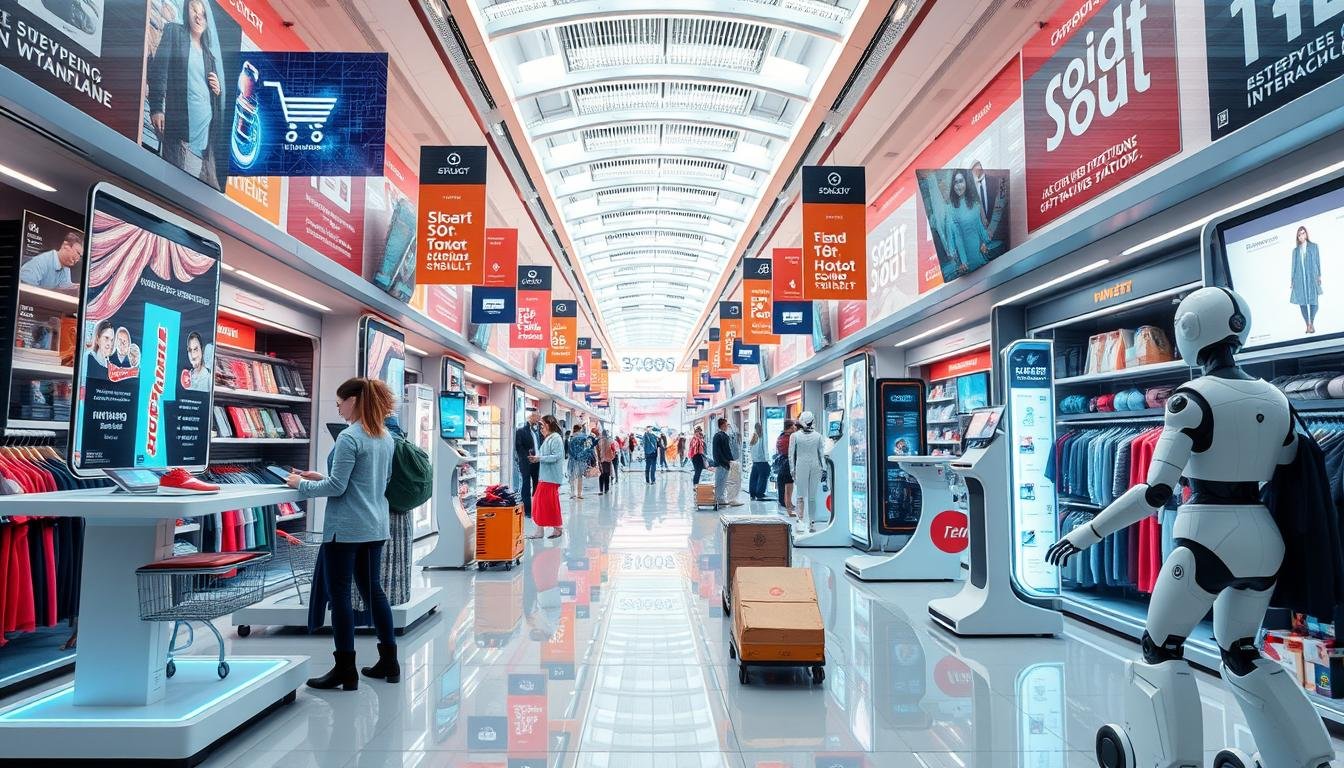In 2024, artificial intelligence is set to change online shopping in big ways. AI, including machine learning and natural language processing, is making digital marketplaces better. It makes shopping more personal, efficient, and secure.
With more money going into AI, it’s clear that keeping up in e-commerce means embracing this change. This shift is making shopping online more fun and easy.
Key Takeaways
- AI in e-commerce is enhancing customer personalization and experience.
- Investments in artificial intelligence are rising, reflecting its significance in retail.
- AI technologies like data mining are optimizing inventory management.
- Natural language processing allows for better customer interaction.
- The application of AI increases overall efficiency in online operations.
- Security measures are improved through advanced AI-driven fraud detection.
The Rise of AI in E-commerce
The world of online shopping is changing fast because of AI. Stores are using new tech to keep up and please their customers. By 2023, over 50% of online shops had started using AI.
This big change shows a clear move toward smart systems that understand customer data well.
AI lets businesses guess what people will buy and handle tasks on their own. It helps make shopping better and faster, which is what today’s shoppers want. Stores are using AI to make shopping more personal and easy.
AI is making a huge difference in how we shop and connect with brands. I’m excited to see how AI will keep improving online shopping, making it even better for everyone.
Personalized Shopping Experiences
In today’s fast-paced digital world, personalized shopping is key to a better customer experience. E-commerce sites use technology to tailor their offerings to each shopper. This makes the shopping journey more engaging and satisfying.
Data-Driven Recommendations
AI recommendations are crucial for customized shopping experiences. Algorithms and machine learning help platforms understand what customers like. For instance, Amazon uses data to suggest products based on what others have bought.
This approach boosts the shopping experience and increases sales.
Dynamic Pricing Strategies
Dynamic pricing is another important part of personalized shopping. AI helps e-commerce sites adjust prices in real-time. This is based on demand, competitor prices, and stock levels.
Walmart, for example, uses AI to keep prices competitive and profits high. This strategy makes shopping more rewarding and helps customers make better choices.
| Strategy | Description | Example |
|---|---|---|
| Data-Driven Recommendations | Using AI to analyze customer behavior for tailored suggestions. | Amazon’s product suggestions based on previous purchases. |
| Dynamic Pricing | Real-time price adjustments based on market conditions and demand. | Walmart leveraging AI for price optimization. |
5 Ways Artificial Intelligence is Revolutionizing E-commerce in 2024
In 2024, AI is changing how businesses talk to customers and run their operations. It’s making a big difference in customer service and order fulfillment. Companies use smart tech to make things smoother and better for customers.
Enhanced Customer Service through Chatbots
AI chatbots are making customer service much better by answering questions fast. Brands are using these virtual helpers for many tasks. For example, Sephora uses chatbots to help shoppers, answering questions and suggesting products.
This way, stores can give great service that today’s shoppers expect.
Streamlined Order Fulfillment
Getting orders right is key in online shopping. AI helps a lot in making supply chains better. It uses smart data to guess what customers will want and keep the right stock.
Companies like Alibaba use AI to make logistics and delivery better. This means orders get to customers on time. It makes things more efficient and happy customers.
Improving Customer Insights with AI
AI has a big impact on e-commerce, especially with AI analytics. Businesses use this tech to understand their customers better. They make smarter choices with real data, not just guesses.
Analyzing Shopping Behavior
AI helps us see how people shop and what they like. It looks at lots of data to find out what customers want. This way, stores can make ads that really speak to their audience.
Predictive Analytics for Inventory Management
AI makes managing stock better for stores. It predicts what products will sell, helping avoid too much or too little stock. For instance, Target uses AI to keep just the right amount of items in stock. This keeps customers happy and makes the store run smoothly.

| Feature | Benefit |
|---|---|
| Shopping Behavior Analysis | Identifies customer preferences for targeted marketing |
| AI Analytics | Transforms data into actionable insights for better decision-making |
| Predictive Analytics | Optimizes inventory management and demand forecasting |
Automated Marketing Solutions
Artificial Intelligence is changing digital marketing, making it easier for businesses to reach customers. AI tools help companies use automated marketing. This leads to better customer connections and more sales.
Targeted Ad Campaigns
Machine learning helps create ads that hit the right people. AI looks at what users like and don’t like. This way, ads are made just for them.
For example, Facebook uses AI to place ads where they’ll get the most attention. This makes ads more effective and engaging.
Email Personalization
AI makes email marketing better by understanding what customers like. Tools like Mailchimp use AI to send emails that really speak to people. This makes emails more personal and interesting.
By using AI, businesses can send emails that customers actually want to read. This leads to more people responding and engaging with the emails.
AI-Powered Fraud Detection
In today’s digital world, stopping fraud is key to keeping online deals safe. E-commerce sites face more threats from scams, so they need strong security. Thanks to AI, businesses can now spot and stop these dangers better.
Security Measures for Online Transactions
AI helps make online shopping safer by checking transactions as they happen. Companies like PayPal lead the way, using smart algorithms to watch for fraud. This not only keeps money safe but also makes customers feel more secure.
By using smart fraud detection, online stores can fight off scams like:
- Phishing schemes
- Credit card fraud
- Account takeovers
- Return fraud
AI keeps improving security, helping online shops stay ahead of scammers. The future of shopping online depends on these technologies to keep it safe for everyone.
| Fraud Type | AI Detection Method | Impact on Business |
|---|---|---|
| Phishing Schemes | Pattern Recognition | Loss of Customer Trust |
| Credit Card Fraud | Behavioral Analysis | Financial Loss |
| Account Takeovers | Identity Verification | Reputational Damage |
| Return Fraud | Transaction Pattern Analysis | Inventory Loss |
AI is changing how we fight fraud online, making shopping safer and more trustworthy. Investing in AI means a safer shopping experience for everyone.
The Future of AI in Retail
The future of AI in retail is full of promise. As I look at the retail advancements coming our way, it’s clear that tech will change how we shop. With e-commerce technology trends, we’ll see big improvements in many areas.
Automation in supply chains is a big deal. Retailers will use AI to make things run smoother and manage stock better. This will cut costs and make shopping easier.
Augmented reality is another exciting area. It will let customers try out products in new ways, helping them make better choices. The future of AI also means better ways to connect with customers, making shopping more personal and building loyalty.
The possibilities for AI in retail are endless. I’m eager to see how companies use these new tools to meet what customers want. With ongoing innovation, AI will change the way we shop for the better.
| Retail Advancements | Description | Impact |
|---|---|---|
| Supply Chain Automation | Use of AI to manage inventory and logistics efficiently | Reduced costs, enhanced speed of service |
| Augmented Reality | Digital overlays to improve the shopping experience | Increased customer engagement and satisfaction |
| Enhanced Personalization | AI-driven insights to tailor marketing efforts | Stronger brand loyalty and repeat customers |
Benefits of AI Integration in E-commerce
Adding AI to e-commerce opens up many chances for businesses. It’s not just about better customer service. It also makes operations more efficient, leading to big changes.
Cost Efficiency and Increased Revenue
AI helps cut down on costs by automating tasks. It makes processes smoother and finds new ways to save money. This boosts profits for many retailers.
AI-driven marketing can reach the right people, boosting sales and keeping customers. Companies using AI see a big jump in revenue. They often see over 10% more money coming in.

Challenges of Implementing AI
Using AI in e-commerce comes with big hurdles. The benefits of new tech are clear, but the AI challenges are real for many companies. I see how complex this journey can be.
One big obstacle in e-commerce is the cost. Businesses need to spend on tech, software, and upkeep. This can be too much for small to medium-sized businesses.
Data privacy is another big issue. Companies gather lots of data, but must follow strict privacy rules. This can make them hesitant to use AI.
Lastly, finding the right people is hard. There’s a big need for experts in AI and data analysis. But, finding these skilled workers is tough.
| Challenge | Description |
|---|---|
| High Implementation Costs | Significant investment needed for software, hardware, and ongoing maintenance. |
| Data Privacy Concerns | Navigating regulations regarding consumer data usage and protection can be daunting. |
| Skilled Workforce Shortage | Difficulties in hiring qualified personnel proficient in AI and machine learning. |
Knowing these challenges helps businesses plan better. They can make smart choices about using AI. Overcoming these AI challenges is key to using tech fully in e-commerce.
Conclusion
AI is changing how we shop online. It’s not just a trend; it’s a big change that makes shopping better. AI helps make shopping personal and marketing smarter, giving businesses great tools.
Looking ahead, using AI is key for businesses to stay ahead. It helps them work better and grow in 2024 and later. AI’s power to change e-commerce is huge, affecting everything from how we shop to how businesses run.
I’m looking forward to seeing AI’s impact on retail. It will make shopping more fun and personal. This shows how tech can take us to new places, changing commerce in exciting ways.






